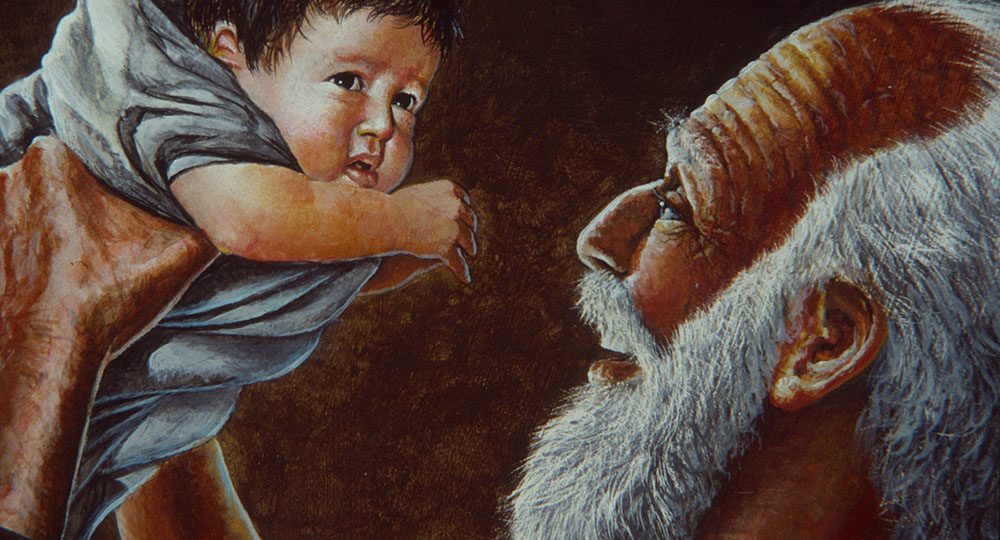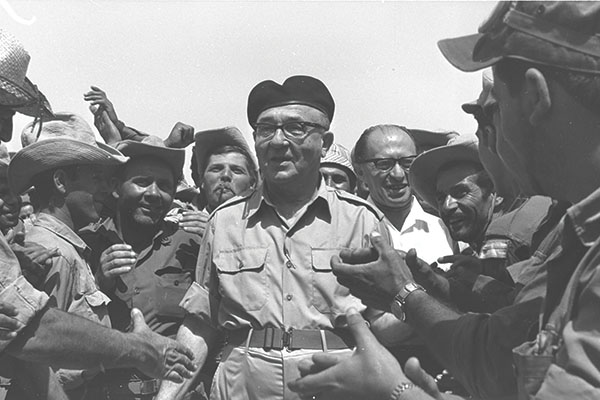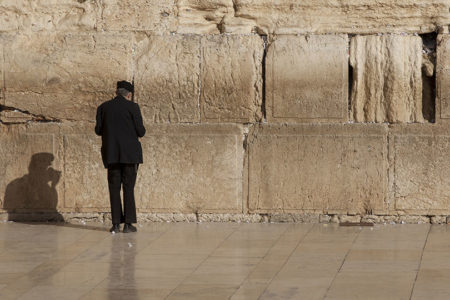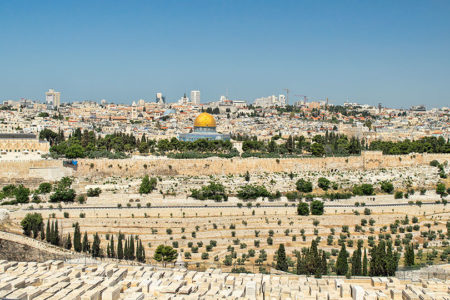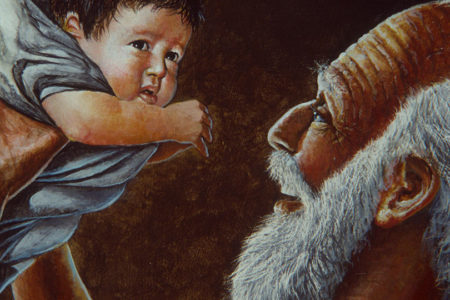My Son! My Son!
In the last article in this series, we saw that Abraham desperately wanted the heir God had promised to him. He realized that Eliezer of Damascus was not the one (Gen. 15:2). Nor was it Ishmael, the son born to Hagar as a result of Sarah’s scheme. No, the promised heir was to be a natural son who would be born to Abraham and Sarah in their old age.
Not a Laughing Matter
Sarah laughed in her tent when she heard the Lord deliver the news to Abraham that she would bear the son promised to them. “Therefore Sarah laughed within herself, saying, After I have become old shall I have pleasure, my Lord being old also? And the Lᴏʀᴅ said unto Abraham, Wherefore did Sarah laugh, saying, Shall I of a surety bear a child, who am old? Is anything too hard for the Lᴏʀᴅ?” (Gen. 18:12–14).
Sarah’s laughter of unbelief turned to rejoicing after the birth of the child (Gen. 21:6–7). What a joy Isaac must have been. God had kept His promise to this elderly couple and given them a son in whom to delight. The very name Isaac relates the sense of joy they must have experienced, for it means laughter. Hebrew names often express the attitude of the parents or the nature of the child. For a couple who had been childless for so many years, Isaac was the perfect name to describe the joy he must have brought to his parents.
A Father’s Heart
Tucked in the middle of the portion of Scripture relating to Isaac’s birth is a little verse that gives some indication of Abraham’s feeling for Isaac. “And the child grew, and was weaned: and Abraham made a great feast the same day Isaac was weaned” (Gen. 21:8).
Many and varied interpretations of this verse are given by the rabbis. Some believe that the weaning did not take place until Isaac had become an adult or at his coming of age at 13. Others believe that it took place when he was approximately three years old. Still others believe that Abraham have the feast to celebrate the miracle that Sarah was able to produce nourishment for the child at her advanced age.
Although the Bible does not give a reason, it is possible that Abraham “made a great feast” because his joy was fulfilled as he watched the young child grow. He had waited so long for an heir, and Isaac was the apple of his eye. He probably invited a multitude of friends to the feast to show his gratitude to the Lord. It must have been a great day in his life.
A Father’s Test
“And it came to pass after these things, that God did test Abraham, and said unto him, Abraham: and he said, Behold, here I am. And he said, Take now thy son, thine only son Isaac, whom thou lovest, and get thee into the land of Moriah; and offer him there for a burnt offering upon one of the mountains which I will tell thee of” (Gen. 22:1–2).
What a test! Abraham had just sent Ishmael away (see Gen. 21:9–21), and that had been very difficult for him. Now all of his dreams and hopes were to be dashed. God instructed him to sacrifice Isaac, the son of promise. His whole life must have flashed before him—all the years of waiting and longing. And he would have to face Sarah and tell her the heartbreaking news.
This was a very real test of Abraham’s faith—the most difficult he had ever faced. Most likely the aged patriarch did not want to carry out the Lord’s instructions. “Why, God?” he probably asked. No answer came. But he had seen the hand of God move in so many marvelous ways in the past; why shouldn’t he obey Him this time?
The clearest picture of what must have gone through Abraham’s mind at that time is given in Hebrews 11:17–19: “By faith Abraham, when he was tested, offered up Isaac; and he that had received the promises offered up his only begotten son, of whom it was said, In Isaac shall thy seed be called; accounting that God was able to raise him up, even from the dead, from which also he received him in a figure.”
In spite of the fact that the Lord asked Abraham to do the most difficult thing he had ever done, Abraham’s faith was strong. He believed that if he offered his beloved son as a burnt offering, God would surely raise him from the dead. Although his faith was severely tested, past experiences had proven that he could fully trust God.
Early the next morning, God’s faithful servant began the long journey from Beer-sheba to Mount Moriah. With Isaac and the firewood in hand, he began the three-day trek, accompanied by two servants. Finally arriving at Moriah, Abraham asked the servants to wait while he and Isaac went on a little farther to worship. He promised that when the worship was completed, he and Isaac would return to them. Now his faith had to be put into action. The moment of truth had arrived.
A Trusting, Submissive Son
Isaac rightly questioned, “My father: and he said, Here am I, my son. And he said, Behold the fire and the wood: but where is the lamb for a burnt offering? And Abraham said, My son, God will provide himself a lamb for a burnt offering: so they went both of them together” (Gen. 22:7–8). Isaac must have had implicit faith in Abraham, no doubt the result a very close relationship between father and son.
“And they came to the place which God had told him of; and Abraham built an altar there, and laid the wood in order, and bound Isaac, his son, and laid him on the altar upon the wood” (Gen. 22:9). Isaac, who was probably about 15 years old, could easily have overpowered his father, who was at least 115 years old, and escaped impending death. But he didn’t. He submitted himself as a sacrifice.
Isaac’s submission foreshadowed that of our Savior, who could have called legions of angels to aid Him as He went to Calvary. Instead, He, as a submissive Son, went to the cross in the will of His Father, never fighting His plan. In like manner, we should submit ourselves totally to our Heavenly Father’s will. We only get into trouble when we do things our own way instead of His.
The Faithful Father
Abraham, the faithful father of Isaac, obeyed his Heavenly Father. “And Abraham stretched forth his hand, and took the knife to slay his son” (Gen. 22:10). With an aching heart, and probably with tears streaming down his face, he came to the ultimate point of the test, the killing of his long-awaited, beloved son. However, Abraham fully trusted his Lord and was obedient to Him.
As Abraham reached back with the knife, about to make the plunge that would end his son’s life, he heard a voice: “And the angel of the Lᴏʀᴅ called unto him out of heaven, and said, Abraham, Abraham: and he said, Here am I. And he said, Lay not thine hand upon the lad, neither do thou anything unto him; for now I know that thou fearest God, seeing thou hast not withheld thy son, thine only son from me. And Abraham lifted up his eyes, and looked, and, behold, behind him a ram caught in a thicket by his horns: and Abraham went and took the ram, and offered him up for a burnt offering in the stead of his son” (Gen. 22:11–13). God the Father had proven Himself faithful once again.
Abraham had faced the challenge of the test. God was satisfied. Isaac was spared. The incident was over. Or was it?
Abraham’s Response
Although the test was completed, the incident was not. Abraham was so grateful to the Lord for sparing Isaac that he “called the name of that place Jehovah-jireh [the Lᴏʀᴅ will provide]” (Gen. 22:14). God had provided for both Abraham and Isaac. He also provided a picture of the substitutionary sacrifice that would one day be given for mankind—His Son, our Lord Jesus Christ, who died in our place for our sins. We also should cry out, “Jehovah-jireh.”
The Reaffirmation of the Covenant
God had made a covenant with Abraham, as recorded in Genesis 12. He confirmed it in Genesis 15. Then, in Genesis 17 God gave Abraham the sign of the covenant, circumcision.
But now, because of Abraham’s obedience at Mount Moriah, the angel of the Lord called again to the patriarch and reaffirmed God’s covenant to him, augmenting it even more (see Gen. 22:15–18). Clearly, the Lord respects those who are obedient to His Word. We are reminded of this in 1 Samuel 15:22: “And Samuel said, Hath the Lᴏʀᴅ as great delight in burnt offerings and sacrifices, as in obeying the voice of the Lᴏʀᴅ? Behold, to obey is better than sacrifice, and to hearken than the fat of rams.” We should ponder these words and practice them.
The Remaining Years
Not long after Abraham’s experience on Mount Moriah, his faithful wife Sarah died at the tender age of 127. He made great preparation for her burial purchasing a field and the cave of Machpelah in Hebron. Burying Sarah in the land of Canaan served as a witness of Abraham’s faith to the children of Israel while they were in bondage in Egypt. It has also been a testimony to the world while the Jews have been in dispersion. God will keep His promises. They will return to the land because God has promised it to them.
As Isaac matured, Abraham was concerned that he marry the right woman, for the promises of God were to be passed on through him. Being advanced in age, Abraham sent his servant to the land of his forefathers to find a wife for the promised son. Rebekah was the woman, and she responded with remarkable faith (see Gen. 24).
In his declining years, Abraham married again. His new wife bore him six sons (Gen. 25:1–2). Then, at the age of 175, Abraham died and was buried beside Sarah in the cave of Machpelah.
A life of faith had ended, but it left behind a most powerful message, as related by the writer of Hebrews. It is a message about faith, and we would do well to heed it.
By faith Abraham, when he was called to go out into a place which he should after receive for an inheritance, obeyed; and he went out, not knowing where he went. By faith he sojourned in the land of promise, as in a foreign country, dwelling in tents with Isaac and Jacob, the heirs with him of the same promise; For he looked for a city which hath foundations, whose builder and maker is God (Heb. 11:8–10).
By faith in the person and work of Christ, we too have an eternal home. We are merely pilgrims and strangers in this world. What we will have beyond this life will be so much better than what we have here below. We rest in God’s promises, anxiously awaiting the day when we arrive at our eternal home. Until then, we are to walk by faith.
